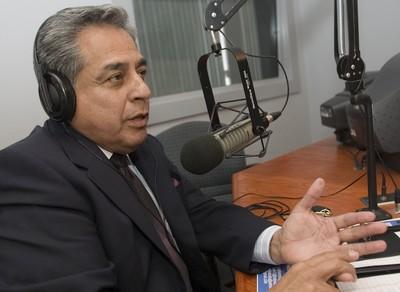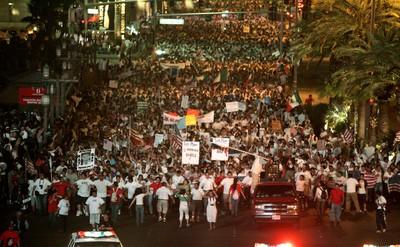March legacy: More voters
Xavier Rivas opened his afternoon radio show on Friday as he does every day: with the Pledge of Allegiance. Then he opened the phone lines and asked his listeners why they don't vote.
"They don't listen to us," one caller said in Spanish. "Our votes don't count."
Another said immigrants spend so much time working that there's none left for voting.
Rivas is host of the Spanish-language radio show "Lo de aqui .... Lo de alla" -- "Here and There" -- on KRLV-AM, 1340. And he is one of many Hispanic activists who have focused on increasing the Hispanic vote in the year since thousands of people calling for sympathetic immigration reform took to the Strip in one of the largest protest marches in Las Vegas history.
"We will get more results with voter turnout than with all that," Rivas said. "We just need to wake up the interest."
A year ago Tuesday, a crowd estimated by police at 8,000 to 10,000 people participated in the march down the Strip.
Students of every age also skipped school that day. Businesses closed and workers stayed home in the national "A Day Without Immigrants" boycott designed to illustrate how important immigrants are to the U.S. economy.
The national debate over immigration reform had taken center stage in a dramatic and local way.
A year later, those who were instrumental in organizing the large May 1 march and boycott say they are still moving full speed ahead on their quest for comprehensive immigration reform. But they are going about it in quieter ways.
"We've been very active this entire year," said Pilar Weiss, the Culinary union's political director. "We're part of a national coalition that has been lobbying Congress on immigration reform. ... We've been encouraging our people to register to vote."
The Culinary union last year sponsored the May 1 immigration rights rally at Fremont Street Experience that preceded the Strip march.
The union also collected 40,000 signatures on a petition to Congress calling for comprehensive immigration reform that includes a clear path to citizenship.
The union did not support the May 1 boycott, however, and encouraged workers not to skip work.
Weiss and others said the May 1 and other 2006 marches were a good way to express solidarity and draw attention to immigration reform, but were just part of a much larger, ongoing picture.
"A year ago, it was very reactionary," said A.J. McClure, Progressive Leadership Alliance of Nevada's Southern Nevada director. "Now, groups have become more strategic and organized. It may look like there's less emotion, but we're going straight to the source, contacting legislators and letting them know we're going to hold them accountable for the decisions and votes that they make."
This year, instead of large-scale marches or boycotts, activists and leaders in the Hispanic community have organized a candlelight vigil for Tuesday at the Lloyd George U.S. Courthouse downtown. The vigil begins at 5 p.m.
"We thought maybe a vigil would be a little more effective (than marches) this year," said Jackie Trujillo, co-chair of UNLV's student MEChA group that last year helped organize student participation in the immigration marches. "A vigil is more in line with what everybody else is doing around the country."
Many local business owners who closed last year in observance of the May 1 boycott have decided to remain open this year.
"I don't think it's necessary" to close, said Javier Barajas, who closed his Lindo Michoacan Mexican restaurant last year, resulting in a loss of about $14,000. "I think it's the wrong way to do it. It makes us look bad."
Indeed, some community leaders say last year's marches and boycotts may have backfired.
"They might have awoken some individuals to the fact that we are here," said Fernando Romero, president of Hispanics in Politics. "To a certain degree, that's had an adverse effect. It has really inspired people who belong to racist organizations to step up to the podium and exaggerate what is going on with undocumented immigrants and Hispanics in general."
Romero said that backlash may have accelerated the push for laws that target immigrants, undocumented and otherwise.
But Weiss said that kind of backlash was happening way before last year's marches.
"It's not a direct response to the marches. It's more the increasing level of frustration that the federal government is not addressing comprehensive immigration reform legislation."
In Nevada, the Legislature is considering two bills that deal with noncitizens' eligibility for the Millennium Scholarship and a third measure to make English the official language of Nevada.
"What it does is say it doesn't matter if you study hard, work hard, we're not going to allow you to continue beyond a 12th-grade education," Romero said of one of the bills, which would deny Millennium Scholarships, student loans and other benefits to noncitizens attending state colleges and universities.
Of making English the official language, he said:
"Whoever doesn't know that English is already the official language of this country is an idiot."
Other Hispanic activists are in favor of the English-as-official-language measure.
"Some of us need that push," Rivas said.
"I compare it to when we were kids. They pressure you to do things, but you appreciate it after the fact. We need to learn English."
Rivas said he will continue to regularly dedicate some of his radio show time to encouraging people to vote.
McClure, too, said his organization will continue the effort, launching a voter registration campaign in July.
"We are targeting the Latino population," he said. "We are placing an emphasis on education and voter turnout, where to go and how to use voting machines."
Weiss said that in addition to focusing on the vote, she and others will continue their long and sometimes frustrating fight for comprehensive immigration reform.
"We have had the platform for comprehensive immigration reform that addressed national security and had a real pathway to citizenship to unify families since 2001," Weiss said. "It's been years of not addressing immigration reform, and we're still working on it."



















